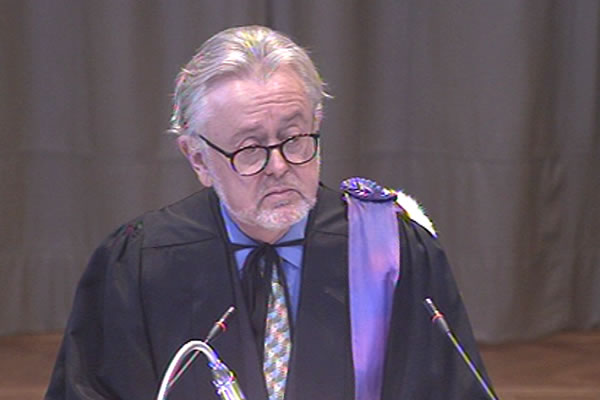Home
‘GENOCIDE WAS THE ONLY SOLUTION FOR KRAJINA SERB PROBLEM’
Concluding their argument on Croatia’s responsibility for genocide in Operation Storm, the Serbian legal team says Tudjman and his associates saw genocide as the ‘only solution’. As a result of their actions, the number of Serbs was reduced to one third of their original number, an ‘unprecedented event in post-war Europe’
 William Schabas, member of Serbian legal team
William Schabas, member of Serbian legal team On the last day of Serbia’s presentation of their arguments on the responsibility of Croatia for genocide in Operation Storm, the first to address the judges was British lawyer Wayne Jordash. The evidence clearly shows that Croatia was directly involved in the acts of genocide as seen in the three chronological stages of Operation Storm, Jordash argued. The first stage was the Brioni meeting on 31 July 1995 where the genocide was planned. Between 4 and 8 August 1995, the plan was implemented. In the months that followed, there was widespread destruction and crimes against those ‘not lucky enough to flee’.
Earlier in the week, the existence of the genocidal intent of the Croatian state leadership was corroborated by quotes from Tudjman and his associates at the Brioni meeting. Today, the same quotes were used profusely. According to Tudjman and his associates, ‘genocide was the only long-term solution for the problem of Serbs in Krajina’, Jordash said. Jordash also quoted from Tudjman’s book, Wasteland of Historical Reality: Tudjman said that ‘changes through genocide’ could bring some benefits, such as ‘a more harmonious ethnic structure’ in the area where genocide was committed.
Tudjman’s plan was accomplished, Jordash said. He reminded the court of the number of 1,719 Serbs who were killed and about 200,000 Serbs who were expelled in Operation Storm. The figures were presented earlier at the public hearings. Most of the crimes were committed before 8 August 1995. The systematic destruction of property and the killing of the Serb civilians who opted to remain in Krajina followed; most of those Serbs were elderly. As the Serbian legal team argued, this was an indication of what would have happened to all the Serbs – a total of 200,000 – had they not managed to flee.
In response to the arguments in Croatia’s brief, Canadian professor William Schabas was even harsher. As he said, ‘peaceful co-existence was not an option for the Croatian leadership’. The plan to commit genocide was agreed on Brioni, just as the ‘final solution’ for the Jewish question was adopted at the Wannsee conference in 1942. Schabas compared the Croatian team’s argument relativizing the quotes from the Brioni meeting with the ‘so-called historians’ who relativized the Wannsee meeting. ‘The criminals met at Brioni and agreed on a criminal plan’, Schabas said, not mincing his words. Schabas recalled that the number of Serbs in Croatia dropped from the pre-war figure of about 580,000 to 186,000. The number of Serbs was thus reduced by two-thirds, dropping from the pre-war 12 per cent to 4 per cent. In Schabas’s words, ‘this was an unprecedented event in post-war Europe’.
In his presentation, the Canadian professor referred in particular to the Tribunal’s judgments against Ante Gotovina and Mladen Markac. The Trial Chamber sentenced them to 24 and 18 years respectively as members of the joint criminal enterprise, but they were then acquitted on appeal. Schabas recalled that five judges in The Hague – three in the Trial Chamber and two in the Appeals Chamber – supported the conviction in which Tudjman, Susak, Cervenko and other deceased Croatian officials were identified as members of the joint criminal enterprise. On the other side, there are the opinions of three judges headed by Theodor Meron. Schabas urged the judges of the International Court of Justice not to ‘dismiss facilely’ the conclusions of the five judges, which include an eminent Dutch judge, Alphons Orie, Italian law professor Fausto Pocar, and Carmel Agius, an experienced judge from Malta. In the opposite camp, there is Meron, described as ‘a brilliant lawyer’ by Schabas, but, as he noted, Meron’s recent judgments have all been ‘controversial’.
Schabas recalled that in their separate opinions attached to the acquittal on appeal, judges Pocar and Agius expressed their views ‘in extremely harsh language: they said that Meron’s judgment was ran ‘counter to all notions of justice’, and that his argument was ‘simply grotesque’, ‘artificial and deficient’.
At the very end of the public hearing, the head of the Serbian team Sasa Obradovic addressed the Trial Chamber. Serbia did not want to file a suit before the International Court of Justice, he said. It did so only when it became apparent that Croatia wouldn’t withdraw its suit. According to Obradovic, the scale of the crimes in Operation Storm couldn’t be compared to any of the crimes against Croats that Croatia has presented. Because of the genocide against them, the Krajina Serbs are among the nations that ‘used to live in dynamic historical communities that barely exist today’.
‘This is not just a loss for the victims but also for the entire humanity’, concluded Obradovic.
The public hearing before the International Court of Justice continues next week. The Croatian side will rebut the allegations presented by the Serbian team on genocide in Operation Storm.
Linked Reports
- Case : Croatia vs. Serbia
- 2014-03-13 ‘KRAJINA SERBS NO LONGER EXIST AS A GROUP’
- 2014-03-12 SERBIA: CRIME OF ALL CRIMES WAS NOT COMMITTED
- 2014-03-12 BRIONI TRANSCRIPTS AS EVIDENCE OF GENOCIDAL INTENT
- 2014-03-18 CROATIA DISMISSES COMPARISONS BETWEEN BRIONI AND WANNSEE
- 2014-03-20 CROATIA RESPONDS TO SERBIAN GENOCIDE DENIAL
- 2014-03-27 SERBIA: CROATIAN LEGAL TEAM'S CHILDISH GAMES, MANTRAS AND FAIRY TALES
